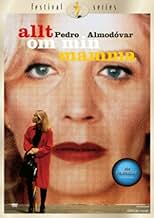ÉVALUATION IMDb
7,8/10
107 k
MA NOTE
Le jeune Esteban veut devenir écrivain et découvrir l'identité de son père que sa mère Manuela lui a soigneusement cachée.Le jeune Esteban veut devenir écrivain et découvrir l'identité de son père que sa mère Manuela lui a soigneusement cachée.Le jeune Esteban veut devenir écrivain et découvrir l'identité de son père que sa mère Manuela lui a soigneusement cachée.
- A remporté 1 oscar
- 59 victoires et 40 nominations au total
Antonia San Juan
- Agrado
- (as Antonia Sanjuan)
Rosa Maria Sardà
- Madre de Rosa
- (as Rosa María Sardá)
Yael Barnatán
- Yael
- (as Yael Bernatán)
Avis en vedette
What a genius Almodovar is! Who else could take such esoteric material and make it not only enjoyable, but relatable. It takes a lot of chutzpah for a male director to swan dive into the gulf of womanhood (I can't believe I just wrote that) and emerge with such truth, HUMAN truth. While the characters of this film seem to represent certain female archetypes, they still flow organically through the ingenious plot. Almodovar shows us that any taboo subject can be tackled without it being exploited when it is done with a compassionate heart. The sheer WARMTH of this movie is what makes it a stunning success. The performances in this film are unforgettable. Cecilia Roth is so dazzling and real, and heartbreaking. But only a genius like Almodovar can break our hearts but still give us hope.
I came to this film wanting to hate it, but I was seduced by it and it affected me deeply. Why hate? Because I had just seen a TV documentary about Almodovar. He talks a good deal of shallow rubbish, and the showbusiness darlings who surround him are vile. However, his film speaks with the sincere voice of artistic talent. It even has a touch of greatness.
It is a film about Woman. Almodovar is well-known for his preoccupation with feminine sensibility, and here we go through the range of female awarenesses - Madre, Puta, Actriz. This is not the 'macro' masculine world of war and politics, but the feminine 'micro' universe of caring, loving and suffering. In a real sense, it is "All About Eve".
Manuela loves her son Esteban totally and unconditionally. When he is taken from her, she must forge a new life. Back in her native Barcelona she finds fulfilment caring for Rosa the pregnant nun and Huma the barren actress. A new Esteban appears, and the cycle of living and loving begins again.
This flimsy summary of the story gives no real idea of the film's symbolic and dramatic richness. It is a pattern made of other patterns, with stories repeating, reversing and overlapping endlessly. Names can mean a break with the past (Agrado, Huma) or they can insist on continuity (Rosa, Esteban). In the guignol tradition, names can also delineate character - Agrado tries to make life agreeable for others, Huma Rojo is red smoke, a hollow illusion, and Nina is an adult with a child's personality.
Almodovar deliberately offends against social custom. Women are fathers, birth means death and drama is more real than life. It is tempting to think of Almodovar as the new Bunuel, and he takes the same childish pleasure in shocking the 'decent' Spanish bourgeoisie. When Agrado gives her performance in the theatre, the old folks walk out in disgust while the youngsters stay and are entertained.
"This play marked my life," says Manuela of 'A Streetcar Named Desire'. It made her a mother (the defining experience of her existence) because it introduced her to Lola. She explains that she played Stella and Lola played Kowolski, literally and figuratively. The male symbol is brutal and cruel, the female symbol is the nurturer of life who endures abuse because she loves. Like Stella, Manuela escaped, pregnant and alone. The play returns later as Esteban's birthday treat and the cause of his death. Manuela knows the text by heart, and when she follows the production to Barcelona, fate pulls her into the drama and she triumphs as Stella. Huma is Blanche, the sad derelict, "relying on the kindness of strangers". (Another link with the play is the title of Almodovar's own production company, "Deseo".)
Esteban's delight with his new book is shown in the reading of the foreword - "es un prefacio maravilloso!" The film, similarly, has a marvellous preface. A bag of plasma drips purposefully, its valve shaped like a crucifix. The symbolism is rich and catholic, and prepares us for what will come - here is a figurative mother, giving the blood of life and suffering the cross of sorrow. Taps, console and graph represent institutionalised care, as opposed to the natural, personal care of a mother. These things are neat and orderly, but cold and soulless. This is the organ donation unit of a hospital. It does excellent work, but we see its effort in fragments rather than a whole. The files list organs, not people - 'higado', 'corazon'. Technology can help us, but it can never replace maternal love. We feel uneasy when we are told that "the machine is breathing for him".
Manuela works as a nurse (symbol of the nurturing mother) in this unit, and we see her as an actress appearing in a training video, playing a mother whose son is dead. Two doctors ask for the boy's organs. New life must be nourished from his body's wreckage. When the scene is repeated for real, it is almost too painful to watch. Almodovar takes us to the 'meta' level, with Manuela's anguish setting up cross-rhythms with her professionalism. Love is stronger than systems, and the organ co-ordinator weeps for Manuela.
The real Manuela stands tiny before a vast advert for 'Streetcar', showing Huma's face. Is the image more potent than the individual? Or is Almodovar saying that superficial impact fades, whereas human empathy endures? What is the relationship between the true woman and her made-up face? Esteban dies pursuing the 'red smoke' of an actress's fame. If he had stayed with his real mother and not chased an illusion, he would have been safe.
Esteban will bestow new life. We go with Manuela as she follows her son's heart to Coruna, where another young man has hope restored. The mulch of death feeds the roots of life. Manuela knows two places, Spain's first and second cities, Madrid and Barcelona (importantly for Almodovar, these are the two pre-eminently 'modern' towns). She moves between them along the tunnel umbilicus, as a pregnant teenager, childless mother and finally as triumphant madonna with the 'new' Esteban.
The spectacular vista of Barcelona and sumptuous portal of Gaudi's Sagrada Familia rapidly disappear, and we are soon in an ugly wasteland where prostitutes parade as grotesques in a hell worthy of Goya. These two Barcelonas recur again and again - the outward city of quirky, appealing architecture and the mean streets of the hopeless, directionless underclass.
Almodovar's narrative has been engrossing up to this point. Now it will expand and deepen as a new cast of characters is woven into the film's fabric.
"Que raro!"
It is a film about Woman. Almodovar is well-known for his preoccupation with feminine sensibility, and here we go through the range of female awarenesses - Madre, Puta, Actriz. This is not the 'macro' masculine world of war and politics, but the feminine 'micro' universe of caring, loving and suffering. In a real sense, it is "All About Eve".
Manuela loves her son Esteban totally and unconditionally. When he is taken from her, she must forge a new life. Back in her native Barcelona she finds fulfilment caring for Rosa the pregnant nun and Huma the barren actress. A new Esteban appears, and the cycle of living and loving begins again.
This flimsy summary of the story gives no real idea of the film's symbolic and dramatic richness. It is a pattern made of other patterns, with stories repeating, reversing and overlapping endlessly. Names can mean a break with the past (Agrado, Huma) or they can insist on continuity (Rosa, Esteban). In the guignol tradition, names can also delineate character - Agrado tries to make life agreeable for others, Huma Rojo is red smoke, a hollow illusion, and Nina is an adult with a child's personality.
Almodovar deliberately offends against social custom. Women are fathers, birth means death and drama is more real than life. It is tempting to think of Almodovar as the new Bunuel, and he takes the same childish pleasure in shocking the 'decent' Spanish bourgeoisie. When Agrado gives her performance in the theatre, the old folks walk out in disgust while the youngsters stay and are entertained.
"This play marked my life," says Manuela of 'A Streetcar Named Desire'. It made her a mother (the defining experience of her existence) because it introduced her to Lola. She explains that she played Stella and Lola played Kowolski, literally and figuratively. The male symbol is brutal and cruel, the female symbol is the nurturer of life who endures abuse because she loves. Like Stella, Manuela escaped, pregnant and alone. The play returns later as Esteban's birthday treat and the cause of his death. Manuela knows the text by heart, and when she follows the production to Barcelona, fate pulls her into the drama and she triumphs as Stella. Huma is Blanche, the sad derelict, "relying on the kindness of strangers". (Another link with the play is the title of Almodovar's own production company, "Deseo".)
Esteban's delight with his new book is shown in the reading of the foreword - "es un prefacio maravilloso!" The film, similarly, has a marvellous preface. A bag of plasma drips purposefully, its valve shaped like a crucifix. The symbolism is rich and catholic, and prepares us for what will come - here is a figurative mother, giving the blood of life and suffering the cross of sorrow. Taps, console and graph represent institutionalised care, as opposed to the natural, personal care of a mother. These things are neat and orderly, but cold and soulless. This is the organ donation unit of a hospital. It does excellent work, but we see its effort in fragments rather than a whole. The files list organs, not people - 'higado', 'corazon'. Technology can help us, but it can never replace maternal love. We feel uneasy when we are told that "the machine is breathing for him".
Manuela works as a nurse (symbol of the nurturing mother) in this unit, and we see her as an actress appearing in a training video, playing a mother whose son is dead. Two doctors ask for the boy's organs. New life must be nourished from his body's wreckage. When the scene is repeated for real, it is almost too painful to watch. Almodovar takes us to the 'meta' level, with Manuela's anguish setting up cross-rhythms with her professionalism. Love is stronger than systems, and the organ co-ordinator weeps for Manuela.
The real Manuela stands tiny before a vast advert for 'Streetcar', showing Huma's face. Is the image more potent than the individual? Or is Almodovar saying that superficial impact fades, whereas human empathy endures? What is the relationship between the true woman and her made-up face? Esteban dies pursuing the 'red smoke' of an actress's fame. If he had stayed with his real mother and not chased an illusion, he would have been safe.
Esteban will bestow new life. We go with Manuela as she follows her son's heart to Coruna, where another young man has hope restored. The mulch of death feeds the roots of life. Manuela knows two places, Spain's first and second cities, Madrid and Barcelona (importantly for Almodovar, these are the two pre-eminently 'modern' towns). She moves between them along the tunnel umbilicus, as a pregnant teenager, childless mother and finally as triumphant madonna with the 'new' Esteban.
The spectacular vista of Barcelona and sumptuous portal of Gaudi's Sagrada Familia rapidly disappear, and we are soon in an ugly wasteland where prostitutes parade as grotesques in a hell worthy of Goya. These two Barcelonas recur again and again - the outward city of quirky, appealing architecture and the mean streets of the hopeless, directionless underclass.
Almodovar's narrative has been engrossing up to this point. Now it will expand and deepen as a new cast of characters is woven into the film's fabric.
"Que raro!"
What I like most about Almodovar's films, this one in particular, is the way he will grab you and pull you into a world you would not normally know and then, confront you with people's lives, emotions, relationships. Manuela, the mother who at the beginning seems so in control and clinical, earnest in her love and with the best intentions for her son, is shown to be much like you and me... full of doubts, questions, a need for answers and trying to understand how her life course has brought her to the present day and made her who she is. Barcelona in winter is richly filmed and serves as a backdrop for the renewing of old satisfying friendships and the budding of new ones, happening simultaneously and somewhat unexpectedly. It rings so true. The slow realisation that we are never really complete, that it's the people we love and live with, or avoid and later regret having done so, that makes us who we are. Almodovar sees the human condition and paints it carefully in this film.
10irin
Almodovar is masterful: he has created a film that seeps into you and rips apart your insides. Each moment is flawlessly crafted- the cinematography and light are lush, the writing is heart-wrenching. Loaded with irony and paradox, the story deals sensitively with a plotline that could have been sensationalistic. The strongest feature is perhaps the acting here, which is consistently superb, particularly in the case of Cecilia Roth, the lead actress. This may be the best film I have ever seen.
One thing is for certain: you sure can't accuse Pedro Almodovar's `All About My Mother' of narrative timidity. In its relatively brief 102-minute running time, it provides a literal smorgasbord of sensational plot elements: a fatal car accident, a dead teenaged son, organ transplantation, transvestite prostitutes, lesbianism, pregnant nuns, drug addiction, AIDS, Alzheimer's, and death by childbirth more than enough juicy elements to warm the heart of any lover of classic melodrama or daytime soap operas. Even if the film had dealt with only half of these issues, it would still be a challenge to maintain some sort of overall focus. As it is, we spend most of the movie staring in head-scratching amazement at the sheer audacity of the enterprise.
Certainly, the critics have not been stingy in heaping effusive praise on the work and both the Motion Picture Academy and the Foreign Press Golden Globe committee have echoed that praise by bestowing on the film their coveted awards for Best Foreign Language Film of 1999. But does the film really merit all these critical hosannas and kudos? Not by a long shot! Jaded as we may be by the deadening predictability and lack of originality that, sadly, define the majority of films released each year, it is, nevertheless, still incumbent upon us not to be bowled over by a film that takes the alternate path of undisciplined bizarreness. `All About My Mother' cries desperately to be a moving and important study of women's roles in society, but, by trying to compress so many of the eccentricities of life into one story, the film leaves us more incredulous and perplexed than stimulated and touched.
One element does succeed brilliantly, however, and that is the outstanding performance of Cecilia Roth in the leading role of Manuela, an attractive 38-year old mother who, upon the sudden death of her child, is compelled to return to the dark past she long ago fled and to seek some sort of redemption. She provides us with the warm center of human compassion this film so desperately needs to keep it from becoming a completely clinical exercise in absurdity. Streamlined perhaps, her story might have made for a fascinating and incisive film. But Almodovar is so busy loading up his film with rather obviously drawn parallels that we really never believe a minute of it. The film is rife with ineffectual and pretentious allusions to `All About Eve' and `A Streetcar Named Desire,' as the movie characters' lives take vaguely similar paths to those of the characters found in those works. And the finale, in which Manuela's maternal affections find a new object to latch on to, seems coy and artificial an attempt to leave the audience on an emotional high after all the misery and heartbreak it has witnessed in the course of the film. The whole enterprise, ultimately, seems hopelessly artificial.
That artificiality at least justifies the gorgeous look of the film. Almodovar has, as always, splashed across the screen his usual array of brightly colored walls, furniture and clothing that makes the film seem to exist in a world located somewhere between realism and surrealism. This bold visual palette is always one of the joyous fringe benefits that accompanies the watching of an Almodovar film.
Unfortunately, in this case at least, he hasn't created a film with a story, cast of characters or theme to match in quality or intensity the glorious, many-hued background he provides. Despite all its many awards and its extraordinary critical acclaim, `All About My Mother' doesn't hold a candle to Almodovar's truly wonderful previous film, `Live Flesh.' Check that one out instead and see the difference.
Certainly, the critics have not been stingy in heaping effusive praise on the work and both the Motion Picture Academy and the Foreign Press Golden Globe committee have echoed that praise by bestowing on the film their coveted awards for Best Foreign Language Film of 1999. But does the film really merit all these critical hosannas and kudos? Not by a long shot! Jaded as we may be by the deadening predictability and lack of originality that, sadly, define the majority of films released each year, it is, nevertheless, still incumbent upon us not to be bowled over by a film that takes the alternate path of undisciplined bizarreness. `All About My Mother' cries desperately to be a moving and important study of women's roles in society, but, by trying to compress so many of the eccentricities of life into one story, the film leaves us more incredulous and perplexed than stimulated and touched.
One element does succeed brilliantly, however, and that is the outstanding performance of Cecilia Roth in the leading role of Manuela, an attractive 38-year old mother who, upon the sudden death of her child, is compelled to return to the dark past she long ago fled and to seek some sort of redemption. She provides us with the warm center of human compassion this film so desperately needs to keep it from becoming a completely clinical exercise in absurdity. Streamlined perhaps, her story might have made for a fascinating and incisive film. But Almodovar is so busy loading up his film with rather obviously drawn parallels that we really never believe a minute of it. The film is rife with ineffectual and pretentious allusions to `All About Eve' and `A Streetcar Named Desire,' as the movie characters' lives take vaguely similar paths to those of the characters found in those works. And the finale, in which Manuela's maternal affections find a new object to latch on to, seems coy and artificial an attempt to leave the audience on an emotional high after all the misery and heartbreak it has witnessed in the course of the film. The whole enterprise, ultimately, seems hopelessly artificial.
That artificiality at least justifies the gorgeous look of the film. Almodovar has, as always, splashed across the screen his usual array of brightly colored walls, furniture and clothing that makes the film seem to exist in a world located somewhere between realism and surrealism. This bold visual palette is always one of the joyous fringe benefits that accompanies the watching of an Almodovar film.
Unfortunately, in this case at least, he hasn't created a film with a story, cast of characters or theme to match in quality or intensity the glorious, many-hued background he provides. Despite all its many awards and its extraordinary critical acclaim, `All About My Mother' doesn't hold a candle to Almodovar's truly wonderful previous film, `Live Flesh.' Check that one out instead and see the difference.
Le saviez-vous
- AnecdotesAgrado's monologue was based on a real life event. When the electronic system of an Argentinian theater failed, the director suspended the show. Actress Lola Membrives decided to give the news to the audience and make them an offer: if they'd stay, they could listen to the narration of her life.
- Autres versionsThree minutes are cut from the US version. The total running time of the Spanish version is 104 minutes.
- Bandes originalesGorrión
Written by Dino Saluzzi
Performed by Dino Saluzzi (bandoneon), Marc Johnson and José Saluzzi
Courtesy of ECM Records
(from "Cité de la musique" 1997)
Meilleurs choix
Connectez-vous pour évaluer et surveiller les recommandations personnalisées
- How long is All About My Mother?Propulsé par Alexa
Détails
- Date de sortie
- Pays d’origine
- Langues
- Aussi connu sous le nom de
- All About My Mother
- Lieux de tournage
- sociétés de production
- Consultez plus de crédits d'entreprise sur IMDbPro
Box-office
- Brut – États-Unis et Canada
- 8 344 738 $ US
- Fin de semaine d'ouverture – États-Unis et Canada
- 50 362 $ US
- 7 nov. 1999
- Brut – à l'échelle mondiale
- 67 958 231 $ US
- Durée1 heure 41 minutes
- Couleur
- Mixage
- Rapport de forme
- 2.35 : 1
Contribuer à cette page
Suggérer une modification ou ajouter du contenu manquant

![Regarder Tráiler [OV]](https://m.media-amazon.com/images/M/MV5BY2IzY2ZlNWQtMjllYi00ZGI4LThhZDEtZWE2MzQ2NzkzMjNlXkEyXkFqcGdeQXRyYW5zY29kZS13b3JrZmxvdw@@._V1_QL75_UX500_CR0)


































